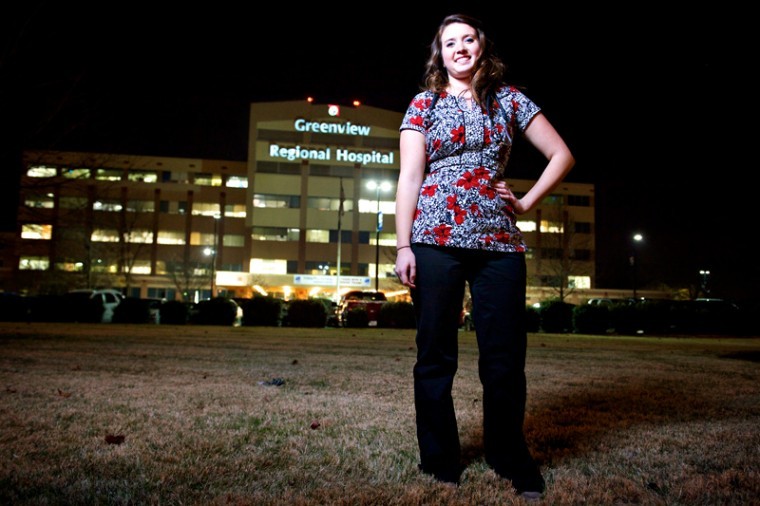Nursing students balance night shifts, school
December 4, 2012
For many college students, a typical weeknight includes homework, watching TV and being asleep by midnight. But at 11 p.m., Sami Crider’s evening isn’t even halfway over.
The Louisville senior has been working the night shift at Greenview Regional Hospital for more than a year-and-a-half.
Crider, a certified nursing assistant, said her job includes helping patients through the night.
The shift, which is from 7 p.m. to 7:30 a.m., is different from working during the day because most of the patients are sleeping. Crider said there is an occasional confused patient or someone who needs help.
Because the night shift is typically slower than the day shift, Crider has time for homework. But with the change of seasons comes a change of pace in the hospital.
“There are more patients in the winter because of the snow,” she said. “We get a lot more older patients.”
A busier shift means more hands-on experience for Crider, who will graduate in December 2013.
“It definitely gives me an edge up on people who don’t have the experience,” she said.
Crider said she also gets to know her patients better than she would if she worked the day shift.
Although she is gaining vital experience, Crider said the workload can be stressful sometimes. Somewhere between classes, work and extracurricular activities, she has to find time to sleep.
“It is the hardest part — not getting enough sleep,” she said.
Getting enough sleep is a big factor for McKinney senior Emily Moore, who worked a night shift at the hospital over fall break.
“It was a lot slower than the day shift because everyone was sleeping,” Moore said. “I was bored out of my mind.”
Moore said she won’t be able to work the shift all the time, nor would she want to.
“I’ll probably have to do it at some point, but I dread doing it,” she said.
For many nursing students, the night shift is particularly challenging because of the heavy workload within the nursing program. For Crider, school takes priority before work.
“I’ve had to call in when I have too much work to do,” Crider said.
Richmond senior Danelle Johnson worked the night shift at The Medical Center in Bowling Green.
Johnson, who is a friend of Crider and also a nursing student, can relate to the busy nature of balancing school and work. She said the 12-hour shifts were the most challenging.
“The first few hours are fast-paced, and then in the middle of the night, it starts to slow down, and you start to get tired,” she said.
But Johnson said the night shift was convenient for her school schedule.
“If I worked the day shift, which is 7:00 a.m. to 7:00 p.m., I wouldn’t be able to go to classes,” she said.
Crider will continue to work late nights until she graduates. She is unsure if she will switch to day shifts when she doesn’t have classes anymore. Whatever she chooses, Crider said the experience offered lessons in nursing, time management and an appreciation of sleep.




















![Megan Inman of Tennessee cries after embracing Drag performer and transgender advocate Jasmine St. James at the 9th Annual WKU Housing and Residence Life Drag Show at Knicely Conference Center on April 4, 2024. “[The community] was so warm and welcoming when I came out, if it wasn’t for the queens I wouldn’t be here,” Inman said.](https://wkuherald.com/wp-content/uploads/2024/04/smith_von_drag_3-600x419.jpg)





